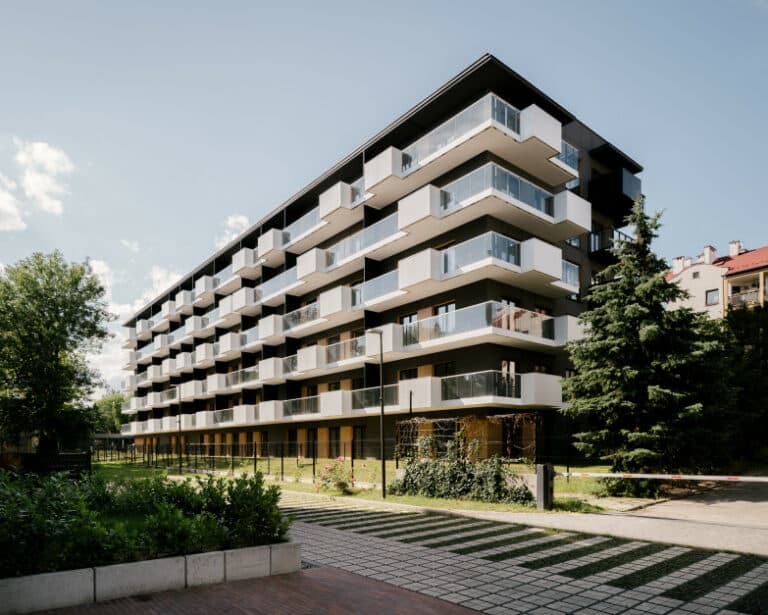Looking for a Silver Lining
Sylwia Ziemacka talks to Monika A Debska-Pastakia, circular economy and impact investment adviser, senior real estate executive, CISL, RICS Civil Commercial mediator, PLGBC board member, mentor in Top Woman in RE
How are international investors looking at Poland right now?
There is a different perspective depending on who you are talking to. Clearly, Poland’s proximity to Ukraine is a very important factor. But there are a number of other factors that are obviously having an impact on the investment market even before the war started, not to mention issues like high inflation, scarcity and escalating prices of building construction materials. Covid and post-Covid has meant a disruption in value chains, having an adverse impact on real estate in our region, not just Poland. A direct consequence of the war in Ukraine has been an outflow of Ukrainian construction workers from our market, estimated at some 10%-11% of the sector’s labour force. However, looking at investment
market sentiment, investors are taking a cautious view. I am sure they recall the previous crisis, although this one is completely different to the financial crisis in 2008 or the previous ones. They are looking at the geopolitical situation and assessing the risks in attracting equity to the Polish market as well as the lenders approach. As most of real estate investors in Poland are international the current sentiment indicates either sitting on the fence, observing the market and not doing very much or being very cautious in considering investment opportunities. I have had discussions with investors looking at various types of assets, such as PRS, small scale retail and offices, with retail not necessarily been the main focus on investors in recent years. So the question really is whether we are seeing a complete halt in making investment decisions for the time being or a move away from the region? Those investors who are more cautious, believing that equity will be traveling further afield, may be refocusing completely out of Europe. An interesting perspective comes from private equity investors regarding the impact of the influx of refugees from Ukraine on the retail market, in particular local neighborhood shopping centers. Their view is that with such an influx of refugees consumer demand could be higher, also bearing in mind that not many Ukrainians are actually traveling further afield
because most of them would like to stay in Poland. As regards the bank lending I have mixed feelings. Some lenders have clearly stated that they would not lend on any new projects. But others indicated they would lend on to their existing clients on selected assets. So again, it is not something that leads me to say it is a complete stop, but to a large degree, of course, there is caution, and in many cases the lenders be limiting their activity for the time being. With hindsight, we observed a different kind of crisis in the past. I remember each one has always had a pause the first six months. Everyone sat on the fence, not saying or doing anything, no decisions being made until a gradual understanding had
emerged as to which way to go. Of course, the current situation is different because it involves a really tragic situation, people losing their lives every single day. Poland is the most affected because it has the largest number of refugees. In terms of the impact on investment market and transaction volumes, there will no doubt be fewer transactions with lower volume. I am not saying that nothing will be happening because some private equity investors are moving forward with a number of transactions.
We might get a different perspective looking at different asset classes, with over two million Ukrainians staying in Poland.
From business perspective let us remember that Ukraine and Belarus have quite strong IT sectors and currently many Ukrainian companies are unable to keep their operations in their home country. They are looking for safer places where they can relocate, mainly in Poland. From this perspective, there could be potential demand for offices as well as production and warehousing facilities.
Perhaps the PRS sector would seize the opportunity of potential demand arising from the current situation.
That’s also my question – COVID has shown that there is a transition in terms of the supply chain and Poland was supposed to benefit from nearshoring. Could this situation have a negative impact?
The benefits of skipping our region in terms of this type of investments and going maybe further to the West is not necessarily an easy decision to make. Poland is a member of the European Union and NATO. President Joe Biden said in Warsaw recently that Article Five is sacred and that whatever happens will affect all members. However, a long term perspective for nearshoring opportunities in Poland are good and some businesses are carefully considering their options. Equally the residential rental market is very much at the centre of attention. Frankly, there is nothing available for rent at the moment from what I hear, because there is such massive demand. Perhaps this will be a springboard to the conversions of some vacant office buildings into residential accommodation.
Is there anything we can predict at this stage – how the market will develop?
Looking at the previous crisis and then also at the COVID crisis, I think that at the end of the day, we were much more successful in going through them than it was expected. And so hopefully this time will also be quite resilient in the situation. On reflection, Poland may also play an important role in rebuilding Ukraine after the war is over. I have recently heard from one of the investors that Poland will be the number one in taking a lead in that process. We have to remain positive in whatever we do, especially in terms of assisting, helping and creating new spaces or creating new opportunities, that is really our role at the moment.
So it’s about defining the challenges but, at the same time, being able to talk about this and be open about it?
Absolutely. I think that our main focus should be on trying to strike a balance in whatever we do and find positive signs. Any sort of silver lining would be beneficial.







